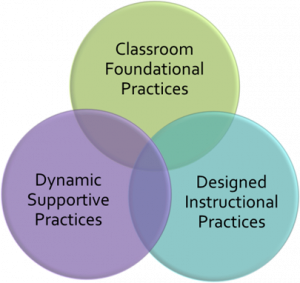
By
Aloysius Anyichie
March 2023
Print Version
What you need to know
With the high level of immigration into Canada, our classrooms are increasingly populated by students with diverse linguistic and cultural backgrounds. All students bring in rich experiences and knowledge that can broaden our teaching and learning perspectives.
The benefits of classroom cultural diversity notwithstanding, it poses challenges to both students and their teachers. For example, culturally diverse students experience a lack of motivation, engagement and success in classroom contexts that are not relevant and meaningful to their background and lived experiences. Similarly, some teachers lack the knowledge and feel unprepared to support linguistically and culturally diverse students’ engagement and motivation. Based on these challenges, there is an urgent need to advance our knowledge of how best to support all students in multicultural classrooms.
Why this research is important
Culturally responsive teaching (CRT) and self-regulated learning (SRL) research, although from different perspectives, document practices that support students’ active learning and motivation. Nevertheless, we know little about the possibility of combining practices from CRT and SRL to maximize their benefits for culturally diverse students. This award-winning study is among the first in Canada to consider the integration of CRT and SRL practices with the aim of supporting all students’ engagement in a multicultural classroom context.
It provides educators, especially those who share different cultural backgrounds with their students, with practical guides for designing an integrated CRT-SRL pedagogical practice. It draws the attention of policymakers to the need to build support for culturally diverse learners in our school districts. For SRL researchers, this study highlights the need to consider the impact of students’ sociocultural context on their regulatory processes while adding to CRT research by revealing how to empower culturally diverse learners’ within culturally relevant classrooms.
How this research was conducted
I developed A Culturally Responsive Self-Regulated Learning Framework that integrated culturally responsive pedagogical practices (CRPPs) and self-regulated learning promoting practices (SRLPPs) to guide teachers in designing empowering and culturally relevant classrooms. This framework has three interdependent components (see Figure 1). Three elementary classroom teachers participated in enacting CRPPs and SRLPPs within their classrooms to foster students’ agency and enhance their engagement. I used a multiple parallel case study design embedded in a mixed-method approach to investigate teacher-enacted practices and how those could be linked to student engagement. Data included: video-recorded observations, document collection, a background survey, photographs of students’ work samples, Experience Sampling Method, teacher and student debriefing meetings, end of the study survey, and final teacher and student interviews.
Figure 1. A Culturally Responsive Self-Regulated Learning Framework

What the researcher found
- Teachers enacted practices based on the integrated CR-SRL framework.
- Teachers experienced both benefits and challenges of the integrated CRPPs and SRLPPs.
- Student engagement and motivation were positively associated with the teachers’ integrated practices. For example, students’ perception of the value and relevance of the classroom activities was associated with their engagement levels. Also, their engagement was optimum in contexts with multiple combinations of CRPPs and SRLPPs.
- Choice provision was found to be key for students’ connection of classroom learning activities to their lived experiences and cultural backgrounds. Overall, the findings show that the framework was beneficial in guiding teachers’ efforts to enhance culturally diverse learners’ engagement and motivation.
How this research can be used
Learning is situated in social and cultural contexts. Therefore, educators need to pay attention to understanding their learners and what they bring into the learning context and build on those to design empowering learning environments for all students.
The CR-SRL framework could be a beneficial resource for facilitating pre-service and in-service teachers’ professional development about how to integrate research-based practices to support all learners in their classrooms.
Acknowledgements
I greatly appreciate all the teachers and students that participated in this study. I immensely thank Drs. Deborah Butler, Nancy Perry, Samson Nashon, and Allyson Hadwin for their insights and support throughout this study.
About the Researcher
Keywords
- complex task
- cultural diversity
- motivation
- self-regulated learning
- student engagement
Publications Based on the Research
Anyichie, A. C. (2018). Supporting all learners’ engagement in a multicultural classroom using a culturally responsive self-regulated learning framework [Doctoral dissertation, The University of British Columbia]. The University of British Columbia Open Collections. https://doi.org/10.14288/1.0375773
Anyichie, A. C., & Butler, D. L. (2023). Examining culturally diverse learner’s motivation and engagement processes as situated in a context of a complex task. Frontiers in Education, 8, 1041946. https://doi.org/10.3389/feduc.2023.1041946
Anyichie, A. C., Butler, D. L., Perry, N. E., & Nashon, S. M. (2023). Examining classroom contexts in support of culturally diverse learners’ engagement: An integration of self-regulated learning and culturally responsive pedagogical practices. Frontline Learning Research, 11(1), 1–39. https://doi.org/10.14786/flr.v11i1.1115
Editor: Christiane Ramsey
Read more BU Research
Research at Brandon University follows comprehensive policies designed to safeguard ethics, to ensure academic integrity, to protect human and animal welfare and to prevent conflicts of interest.

